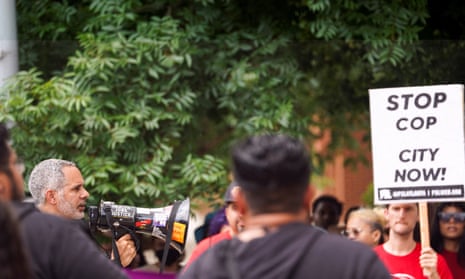Atlanta activists in drive to put fate of controversial ‘Cop City’ on ballot

"Volunteers are fanning out across Atlanta looking to get tens of thousands of voters to sign a petition that would put the fate of the controversial police and fire department training center known as “Cop City” on a November ballot, even as organisers have accused the city of unfairly delaying the start of the effort.
Cop City came to global attention after police shot dead Manuel Paez Terán, an environmental protester, in a January raid on the forest – the first incident of its kind in US history. The state says Paez Terán shot first. A special prosecutor is evaluating the case.
After two weeks of apparent stonewalling and a lawsuit, city officials approved the petition on Thursday afternoon that allows organizers to move forward with a historic referendum aimed at giving the city’s voters a chance to decide if they want Cop City.
The city had rejected or delayed approving the petition three times in the last two weeks, leading observers to cry foul over what appeared to be anti-democratic moves to hamper city residents from voting in November.
The delay was not just a bureaucratic bump in the road: the longer the city took to approve the signature-gathering form, the less time organizers would have to get an estimated 70,000 voters to sign, since the city also has 50 days at the end of the process to determine if the signatures meet requirements.
The referendum effort launched after the estimated thousand people who showed up at city hall on 5 June proved insufficient to stop Atlanta’s city council from approving about $67m for the project. The center’s total cost will be about $90m.
On 7 June, organizers gave a draft of the petition to the city clerk. By law, the city should have responded in seven days. On the seventh day, the clerk said the petition was missing a line. Then, instead of quickly approving a revised version, the office closed early on Friday 16 June, ostensibly for the Juneteenth holiday the following Monday.
Organizers filed a lawsuit to get a judge to force the city to act. But Tuesday, nearly two weeks after seeing the original petition, the city clerk added three reasons for rejecting it, including a missing ordinance number. On Thursday, the city finally notified organizers that they had approved the petition, and signature-gathering could begin.
Within hours, dozens of volunteers fanned out across the city, soliciting signatures from Atlanta voters.
Meanwhile, obstacles were not lost on observers within and outside the effort. “It’s clear that, under code, this process was meant to be rubber-stamped. Instead it became us begging, said Alex Joseph, an attorney on the referendum’s legal team. “We did not anticipate this first step would be contentious … [and] we may have to fight every step of the way.”
The city clerk Vanessa Waldon declined to comment to the Guardian about the delays, citing the lawsuit. But to some the politics were clear.
“Certainly within city hall, they don’t want to see the referendum – it keeps the issue alive in the public eye, and every second it stays alive, there might be more people against it,” said Michael Leo Owens, Emory University political science professor and an author of the only academic poll on the project, which showed a city nearly evenly divided on the issue.
Organizers have also conducted a survey, as yet unpublished. It shows a city nearly evenly divided – but about 22% of Black respondents were undecided. Atlanta’s population is 48% Black, 41% white.
“Our analysis indicates that this referendum … will come down to the 22% of Black voters who are undecided,” said Paul Glaze, spokesperson for the campaign. “People feel betrayed by the huge cost to taxpayers so we’re going to ask them a simple question, ‘What would you do with $100m to make Atlanta safer?’”
The referendum will be a first in the city’s 186-year history. Although statewide referendums are relatively common in other parts of the US – particularly the west – “Georgia and the majority of southern states don’t have citizen-led, statewide processes – [because] most states with slaves did not want to create the opportunity for people to directly decide on policies,” said Chris Melody Fields Figueredo, executive director of the Ballot Initiative Strategy Center.
Local, municipal initiatives are allowed under various southern constitutions, however, and the Cop City effort borrows from a successful referendum last year in Georgia’s Camden county, where voters stopped a spaceport. As for Atlanta: “This is a historic initiative,” Figueredo said.
Because of this, the “playbook is being written in the middle of the process,” Figueredo said. Also, many referendums deal with one issue, she said. “What’s unique about Cop City is the intersectionality of multiple issues – environment, economics, the criminal justice system, democracy.”
The city’s green light on Thursday resulted in an immediate uptick in public interest, organizers told the Guardian. Grassroots, individual donations over a 24-hour period reached nearly $18,000, five times what they were in the previous week, said Dom Kelly, whose organization, New Disabled South, is a fiscal sponsor for the effort. Those came from 38 states, showing the issue’s reach. Organizers estimate the effort could cost up to $3.5m.
As well, nearly 300 people signed up to volunteer in one day – adding to the 3,000-plus who had already done so. There will be trainings for canvassers three times a day in the coming weeks, with door-knocking and mass events planned.
Kamelly Alejos, 21, was one of those volunteers. Right before rush hour on Thursday night, she approached shoppers in front of a Kroger supermarket with a clipboard. One of them, Micah Kennedy, 48, said he signed the petition because “we need to be able to put this on the ballot and let the people decide if they’re for or against it. We should have some kind of self-determination.”
No comments:
Post a Comment